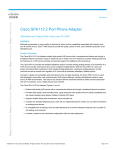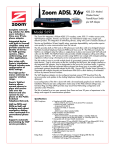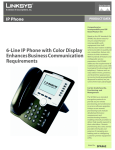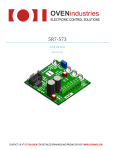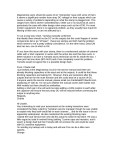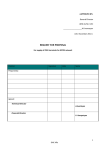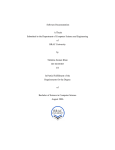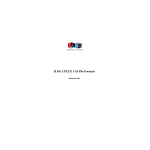Download OBi202 VoIP Telephone Adapter with 2-Phone Ports
Transcript
Detailed Technical Specifications OBi202 VoIP Telephone Adapter with 2-Phone Ports, Router & USB With Support for Four (4) SIP and OBiTALK VoIP Services With the OBi202, you are in control of your digital & analog communications life. Via the OBi202’s two (2) on-board phone connections as well as via the Internet to other OBi endpoints via Obihai’s free OBiTALK network or up to four (4) available VoIP services, you have the power make and receive phone calls and faxes as well as bridge mobile, fixed line and Internet telephone services. The OBi202 supports the T.38 fax standard for reliable facsimile calls over the Internet. The OBi202 is equipped with a 2-port router/bridge with support for integrated quality of service (QoS). The OBi202 may be installed in a variety of environments that either do not have an available Ethernet port and/or locations where upstream voice traffic needs to be prioritized above other types of traffic like web surfing and uploading pictures and movies. The OBi202 USB port serves multiple purposes. Using the OBiWiFi Wireless Adapter, the OBi202 can be placed anywhere within range of an 802.11b/g/n access point. Or, the USB port can be connected to a storage device to enable local and remote access of stored files over the Internet by authorized users. The OBi202 is a dedicated device, built with a high-performance system-on-a-chip platform to ensure high quality voice conversations. The OBi202 has high availability and reliability because it is always-on to make or receive a call. With the OBi202, a computer is not required and a computer does not need to be on to talk to people. To get started, all you need is a phone, power and a connection to the Internet. The OBi202 is Complemented by Other OBi Products & Services OBiTALK: A web portal for device management and service configuration. OBiTALK also allows its members to add people and associated OBi endpoints to “circles of trust” such that additional functionality can be shared amongst authorized users. The OBiTALK portal is also where members can download the OBiON applications for smart phones and Internet connected devices like the iPhone, iPad, iPod touch & Android. OBiON iPhone, iPad, iPod touch & Android Devices: An application for iPhone, iPad, iPod touch and Android devices which makes possible placing and receiving calls to/from other OBi endpoints. OBiON PC: A middleware application for a PC that facilitates placing and receiving calls to/from other OBi endpoints. Key Features of the OBi202 VoIP Telephone Adapter: SIP Service Provider Support for Up to Four (4) SIP Accounts Any Available Service Can be Accessed from Each Phone Port Independently Aggregation / Bridging of Four (4) SIP and One (1) OBiTALK Service Automatic Attendant for Simplified Call Routing (AA) Call Back Service – Automatic Call Back to Connect User to the AA to Make a New Call or Ring the Attached Phone OBiTALK Web Portal Integration -1- Configuration and Management of OBi Endpoints Download OBi Client Applications for Smart Phones, Internet Devices & PCs Creating & Joining Circles of Trust So You Can Share Your OBi Setting Up Your OBi Endpoint Speed Dial Directory Configurable to Work with Any SIP Compliant Internet Telephone Service Analog Phone Impedance Agnostic Robust Telephony Features: Caller ID – Name & Number Call Waiting Message Waiting Indication - Visual and Tone Based Speed Dialing of 99 OBi Endpoints or Numbers Three Way Conference Calling with Local Mixing Hook Flash Event Signaling Call Forward - Unconditional Call Forward on Busy Call Forward on No Answer Call Transfer Anonymous Call Block Anonymous Call Do Not Disturb Call Return Repeat Dialing Caller ID Pass-Thru Powerful Call Routing & Voice Service Features: SIP Support for Voice and Fax Over IP (T.38 and G.711 pass-thru) from Internet Telephony Service Providers OBiTALK Managed VoIP Network for OBi Endpoint Devices & Applications High Quality Voice Encoding Using G.711, G.726, G.729, iLBC Algorithms Recursive Digit Maps & Associated Call Routing (Outbound, Inbound) General Brand Obihai Browse Obihai Devices Manufacturer Obihai Hardware Designer Obihai Technology, Inc. Model Name OBi202 Release Date April 2012 Microprocessor Width of Machine Word 32 bit Instruction Set ARM FXS SLIC (Subscriber Line Integrated Circuit): Phone 1 / Phone 2 Ringer Specifications Ring Frequency: 14Hz – 68Hz Ring Waveform: Trapezoidal, Sinusoidal Ring Voltage: 55v – 85v Maximum Ring Load 5 REN (Ringer Equivalence Number) FXS (PHONE Port) Configuration Settings Recursive Digit Map & Associated Outbound Call Routing On-Hook Tip Ring Voltage: 30v – 52v Off-Hook Current Max: 15mA – 45mA Impedance: 12 Independent Settings -2- DTMF Playback Level: -90 dBm – 3dBm Caller ID Method: Bellcore, ETSI (FSK or DTMF) Caller ID Trigger (Before / After First Ring, Polarity Reversal) Channel Tx Gain: -12dB to 6 dB at 1 dB Resolution Channel Rx Gain: 12dB to 6 dB at 1 dB Resolution Silence Detect Sensitivity Hook Flash Time Max Hook Flash Time Min CPC Delay Time CPC Duration Idle Polarity Connect Polarity Management – Configuration Local Access Interface IVR, Web Page – Password Protected (Admin & User Level Log-in) Remote Access Interface Syslog (Multi-Level Granularity), Invokable via SIP Notify, Web, Provisioning Device Web Page Standard HTTP v1.1, XML v1.0 Remote Provisioning XML via TFTP or HTTP, TR069 / TR104 Secure Remote Provisioning SSL via HTTPS , Encrypted XML via HTTP or TFTP – Dedicated User Name & Password Secure Remote Firmware Update Encrypted Binary File via TFTP or HTTP + Dedicated User Name & Password Customization OBi-ZT: Obihai Zero-Touch Automatic Customization & Configuration ** Call History (CDRs) Call Detail Records on OBi Web Page, Export to XML LED Indications Power, Device Status, Upgrade Progress Status, Ethernet Activity, PHONE Status RTP Statistics RTP Transport Type Audio Codec Type (Tx/Rx) RTP Packetization - ms (Tx/Rx) RTP Packet Count (Tx/Rx) RTP Byte Count (Tx/Rx) Peer Clock Differential Rate - PPM Packets In Jitter Buffer Packets Out-Of-Order Packets Interpolated Packets Late (Dropped) Packets Lost Packet Loss Rate % Packet Drop Rate % Jitter Buffer Length - ms Received Interarrival Jitter - ms DTMF Digits Received Jitter Buffer Underruns Jitter Buffer Overruns Sequence Number Discontinuities Skew Compensation - ms Session Information SIP Session Status OBiTALK Status Phone Port Status (Phone 1 and Phone 2) Primary SIP Service Set-Up Wizard Dedicated Device Web Page for Quick ITSP Account Set-Up System Settings Back-Up / Restore Save & Restore Configuration via XML file to / from a Local Folder Security Local Access Interface IVR Password Remote Access Interface User Name & Password Access via HTTP, TFTP – HTTPS Device Web Page Standard HTTP v1.1, XMLv1.0 Secure Remote Provisioning TFTP, HTTP, HTTPS -3- Network – Application Details Data Networking VoIP MAC Address (IEEE 802.3) UDP (RFC 768) TCP (RFC 793) IP version 4 (RFC 791) – Static IP and DHCP Support ICMP (RFC 792) ARP - Address Resolution Protocol Domain Name System (DNS) A Records (RFC 1706) & SRV Records (RFC 2782) RTP (RFC 1889, 1890) RTCP (RFC 1889) DHCP Client (RFC 2131) LAN (Computer) Port May be Configured as a Router or Bridge DHCP Server (RFC 2131) DHCP Client Reservation PPPoE (Point-to-Point Protocol over Ethernet) client (RFC 2516) MAC Address Cloning Port Forwarding DiffServ (RFC 2475) – Independently Configured: Service, SIP & Media ToS (RFC 791, 1349) – Independently Configured: Service, SIP & Media VLAN Tagging (802.1p) – Independently Configured: Service, SIP & Media SNTP (RFC 2030) – Primary & Secondary NTP Servers Firewall with: - DRDOS Attack Protection - VPN Pass Through - NAT Redirection DMZ Mode QoS Features - Upstream Data Rate Allocation - Highest Priority (Voice) Bandwidth Allocation - Priority Class Assignments (4) for Bandwidth Allocation - DiffServ Code Point (DSCP) to Priority Class Mapping VPN Pass-Thru - IPsec ESP (IP Security encapsulating security payload) - PPTP (Point-to-Point Tunneling Protocol) - L2TP (Layer 2 Tunneling Protocol) Four (4) Service Provider Configuration Profile Assignments (ITSP 1-4) Four (4) Service /Trunk Subscription Profile Assignments (SP 1-4) SIPv2 (RFC 3261, 3262, 3263, 3264) SIP over UDP SIP over TCP SIP over TCP with TLS 4 SIP Service Provider Service Sessions – Concurrent Operation 2 OBiTALK Service Session SIP Proxy Redundancy – Local or DNS Based SVR, Primary & Secondary Fallback List Restrict Source IP Address Maximum Number of Sessions – Independent per Service Trunk Groups (4) Voice Gateway – Direct Dialing (8) G.711 A-Law (64 kbps) G.711 µ-Law (64 kbps) G.726 (32 kbps) G.729a (8 kbps) iLBC (13.3, 15.2 kbps) Codec Pre-selection Code Voice Processing per SIP Service – TX/RX Audio Gain, Echo Cancellation Adjustable Audio Frames per Packet Codec Name Assignment Codec Profile per SIP SP (2) & OBiTALK Service Dynamic Audio Payload Packet Loss Concealment -4- VoIP cont. Jitter Buffer (Adaptive) STUN ICE SUBSCRIBE / NOTIFY Framework (RFC 3265) NOTIFY Dialog, Line Status SUBSCRIBE Message Summary VoIP NAT Interworking DATE Header Support Remote-Party-ID (RPID) P-Asserted-Identity (PAID) RTP Statistics in BYE Message Media Loopback Support Telephony Configurable Contact List (Inbound Call Routing) Automatic Attendant (English) with Configurable Answer Delay PIN Access Control to AA (Up to 4 PINs) Recursive Digit Map for Call Routing (AA, Phone, Voice Gateways, Trunk Groups) AA Configurable Outbound Call Routing Rule SIP Service Configurable Inbound Call Routing Rule (2) Direct / Single-Stage Dialing (Route to Voice Gateway) Fax Pass Through (G.711) T.38 Fax Relay for Real-Time Fax over IP Modem Pass Through (G.711) In-Band DTMF (G.711) Out of Voice Band DTMF (RFC 2833) Out of Voice Band DTMF (INFO Method) Call Progress Tone Generation Tone Profile per SIP SP and OBiTALK service Ring Profile per SIP SP and OBiTALK service Star Code Profile per SIP SP and OBiTALK service Full Duplex Audio G.165, 168 Echo Cancelation VAD – Voice Activity Detection Silence Suppression Comfort Noise Generation Three Way Conference Calling with Local Mixing Hook Flash Event Signaling Flash Hook Timer Caller ID – Name & Number per Bellcore, ETSI and DTMF MWI – Message Waiting Indicator Visual Message Waiting Indication (VMWI) Daylight Savings Time Support – North & South Hemispheres Caller ID Enable /Disable Caller ID Number Caller ID Name (Alphanumeric) Caller ID Spoofing Call Waiting Maximum Session Control Call Forward - Unconditional Call Forward on Busy Call Forward on No Answer (Ring Count Configurable) Call Transfer Enable / Disable Anonymous Call Block Anonymous Call Do Not Disturb Call Return Repeat Dialing Call Progress Tones Configurable Call Progress Tone Call Progress Tone Profiles (2) Dial Tone Busy Tone Ringback Tone -5- Call Progress Tones cont. Star Code Configuration Reorder Tone Confirmation Tone Holding Tone Second Dial Tone Stutter Tone Howling Tone Prompt Tone Call Forwarded Tone Conference Tone SIT Tones (1-4) Ringing & Call Waiting Tone Configuration Ring Patterns (10) - Configurable Call Waiting Tone Patterns (10) - Configurable Call Waiting Tone Pattern Profiles (2) Configurable Start Codes Star Code Profiles (2) Redial Call Return Activate Block Caller ID Deactivate Block Caller ID Block Caller ID Once Unblock Caller ID Once Activate Call Forwarding (All Calls) Deactivate Call Forwarding (All Calls) Activate Call Forward on Busy Deactivate Call Forward on Busy Activate Call Forward on No Answer Deactivate Call Forward on No Answer Activate Block Anonymous Calls Deactivate Block Anonymous Calls Activate Call Waiting Deactivate Call Waiting Activate Do Not Disturb Deactivate Do Not Disturb Activate Repeat Dial Deactivate Repeat Dial Interfaces & Indicator Lights Internet (WAN) 1 x 10/100BaseT Ethernet Port (802.3) LAN 1 x 10/100BaseT Ethernet Port (802.3) Phone (FXS) 2 x RJ-11 FXS Analog Phone Port USB USB 2.0 for use with OBiWiFi, OBiBT, OBiLINE Reset Button Yes – Located on Bottom of Case LEDs 5 – Power/Status, Ethernet Activity (WAN), Ethernet Activity (LAN), Phone 1, Phone 2 LED Indications Power On, Status, Upgrade in Progress Status, Packet RX/TX, Phone Port Status Certifications FCC Part 15 Yes – Class B A-Tick Yes CE Yes ICES-003 Yes RoHS Yes WEEE Yes UL/cUL Yes – Power Adapter -6- Environmental Operating Temperature 0º to 45º C (32º to 113º F) Storage Temperature -25º to 85º C (-13º to 185º F) Operating Humidity 10% to 90% Non-condensing Non-operating Humidity 10% to 90% Non-condensing Physical Attributes Dimensions: (width x depth x height) 10.5 cm x 11.4 cm x 3.0 cm 4.1 in x 4.5 in x 1.2 in Unit Weight: 255 grams / 9 ounces Shipping Weight 390 grams / 14 ounces (Including Power Supply, Ethernet Cable and Packaging) Mounting Wall & Desktop Mountable Power Supply Type Universal Switching with Fixed US, EU, UK Style Plug Prongs (Model Dependent) Input Power AC Input: 100 to 240 Volts 0.3A 50-60Hz (26-34 VA) Output Power DC: +12V 1.0 Amp Max Carton Specifications Units Per Carton 20 Units Carton Dimensions 36.0 cm x 33.0 cm x 26.8 cm – 14.2 in x 13 in x 10.5 in Carton Weight 8.2 Kilograms / 18 pounds Cartons Per Std. 20 / 40 ft Container 896 / 1,848 Cartons – Non-palletized Miscellaneous Requirements Active Internet Connection Analog Touch Tone Phone Access to Internet Via a Switched Ethernet Port on Home or Office Router (Optional) Active Internet Phone Service Subscription with All Required SIP Credentials to Make & Receive Calls Documentation Quick Start / Installation Guide User / Administrative Guide Implementation Guide for Service Providers ** Package Contents OBi202 Voice Service Bridge and Telephone Adapter Power Adapter 1 x RJ-45 Ethernet Cable (80 inches / 203 centimeters) Quick Start / Installation Guide Warranty 1-Year Hardware (Limited) Engineering & Design Location California, USA HST Code 8517.62.00 Data Sheet State All content subject to change. This data sheet is not a warranty. Data Sheet Version 131217.202.3 ** For Service Providers Only iPhone, iPad and iPod touch are trademarks of Apple Computer, Inc. Android is a trademark of Google, Inc. OBi, OBiAPP, OBiON and OBiTALK are trademarks of Obihai Technology, Inc. All other trademarks mentioned in this document are property of their respective owners. This document is provided by Obihai Technology for planning purposes only. No warranty is implied. Do Not Use For Emergency Service Calls Obihai Technology does not warrant the availability or quality of the OBiTALK network. Furthermore, Obihai Technology will not be liable to you or any third party for any costs or damages arising directly and or indirectly -7- from the use of this product’s hardware & software including without limits any damage, or for any loss whatsoever. ©2010-2013 Obihai Technology, Inc. All rights reserved. -8-








